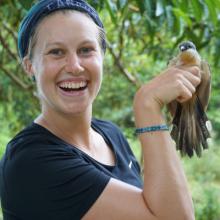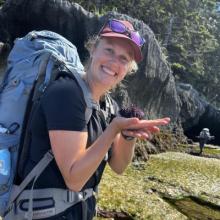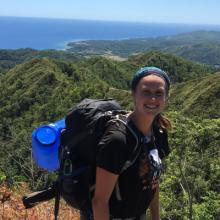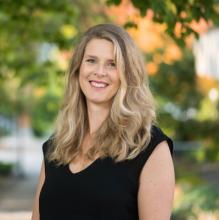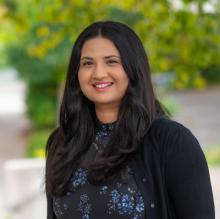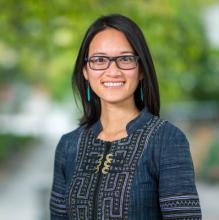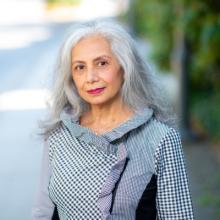Being a public scholar means transcending the traditional boundaries of academia and involving the communities which may be impacted by our research within our work. It means connecting and giving back.
Research Description
The Galapagos islands are famous for the unique species that inhabit the islands, amongst them Darwin’s finches which inspired Charles Darwin’s theory of evolution. However, with the recent influx of humans to certain islands, many landbirds have suffered declines and are endangered. Through an interdisciplinary lens, my PhD aims to better understand the interactions between Galapagos landbirds, farmers and the agricultural landscape to work towards the conservation of these birds in ways which can also benefit farmers. Recognizing that conservation science is as much a social science as a biological one, my goal with the public scholars’ program is to bring my research back to the community through video communication and workshops.
What does being a Public Scholar mean to you?
To me, being a public scholar means transcending the traditional boundaries of academia and involving the communities which may be impacted by our research within our work. It means connecting and giving back. I am really excited to be a public scholar since I firmly believe our greatest impact as researchers comes when we acknowledge the interconnectedness of the world around us and ensure we do not work in a limited space (i.e. purely academic setting) in order to contribute positively to our society and environment.
In what ways do you think the PhD experience can be re-imagined with the Public Scholars Initiative?
The Public Scholars Initiative gives space for our PhD research to be valued in a context outside of “the literature” or traditional academic settings and promotes thinking of our PhD as a way to contribute to society through a variety of ways such as working with community partners or sharing our research in interactive ways with a more general audience. In other words, it gives our PhD the ability to come off paper and walk in its own shoes in the real world.
How do you envision connecting your PhD work with broader career possibilities?
My PhD has allowed me to gain practical skills which will indubitably prepare me for my career post-PhD. It is a period in my life where I have the freedom and flexibility to gain experience in areas of interest whilst working towards biodiversity conservation. These areas of interest are: education through TAing and subsequently becoming an instructor for an undergraduate course; project management through coordinating and executing two long field seasons and leading a team; data analysis through collecting a wide variety of larger datasets from scratch and getting results from them; and research through honing my ability to question, write and experience the whole process of research start to finish multiple ways and in multiple fields. I definitely think my PhD has broadened my career possibilities and given me the skills necessary to succeed.
How does your research engage with the larger community and social partners?
My research would not be possible without the support of community partners in particular the Charles Darwin Foundation and the Ministry of Agriculture in Galapagos who are key to helping me establish local connections and whom I consult on my research questions and ideas before implementation. In addition to local organizations, my research works closely and directly with farmers of Galapagos. I have learnt a lot about the joys and struggles of farming through them and strive to incorporate their voices in my work, as well as share with them the findings of my work which are directly relevant to them as they are the people living on the land with the birds on a daily basis. Through PSI, I will be able to create videos to share my work with Galapagos farmers, as well as develop and host workshops for farmers tailored to their interests about birds.
Why did you decide to pursue a graduate degree?
I have pursued both my graduate degrees (MSc. and PhD) because of research experiences I have been lucky to have abroad (Panama and Galapagos respectively) which I have really enjoyed and have inspired me to continue working towards conservation through research. During my MSc I was looking for a thesis project and on a whim, reached out to the Charles Darwin Foundation in Galapagos since as a biologist, it had always been a dream of mine to work there. I got very lucky they responded and in 2019 I carried out the first study focused on birds in the agricultural zone of Santa Cruz island in Galapagos. I recognized the privileged and unique position I was in to continue this research and firmly believed and still believe in the importance and value of working to conserve these birds. It inspired me to pursue a PhD and here I am!
Why did you choose to come to British Columbia and study at UBC?
I came to UBC for three reasons. First, I was looking for an interdisciplinary program that would encourage and support me to ask both biological and social questions in an applied manner with a problem-oriented mentality. The Institute for Resources, Environment and Sustainability is a top-ranked program which ticked off these boxes. Second, I was inspired by the work of my supervisor, Dr. Claire Kremen, in both applied conservation and academic settings, as well as her experience with the ‘bigger picture’ of my research which is asking how to reconcile agricultural land use with biodiversity conservation. Lastly, I was very excited to move back to Canada and Vancouver in particular drew my attention because I love being outdoors and wanted to explore the other side of Canada (I did my BSc. at McGill in Montreal).

